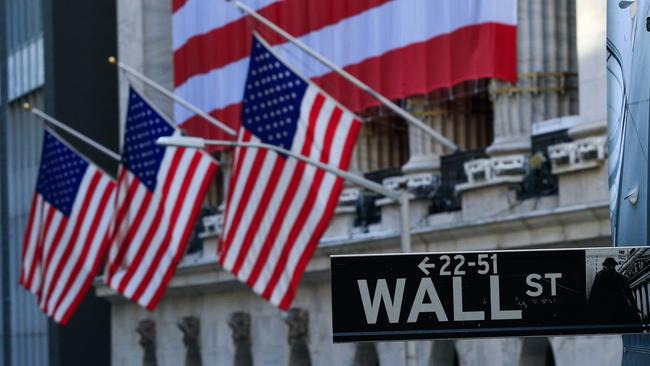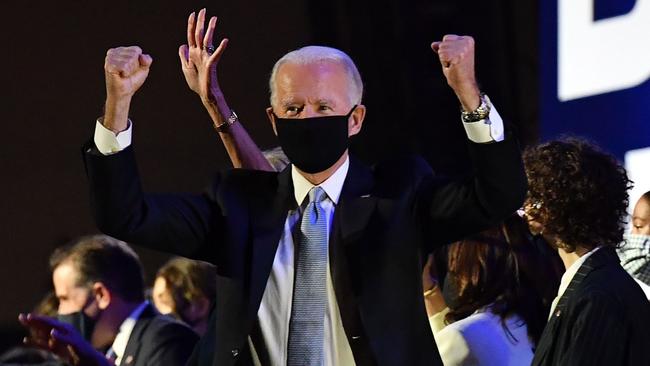Terry McCrann: Politics not driving Wall Street bullishness this time
Global share markets are on the march but its expectations of further central bank stimulus, rather than the US election result, which is the key driver, writes Terry McCrann.

Terry McCrann
Don't miss out on the headlines from Terry McCrann. Followed categories will be added to My News.
It’s the election, stupid. And their Fed and our Reserve Bank.
But the election first, and then what the Fed might – almost certainly, will – do and what our RBA actually did do last Tuesday.
Normally, with elections – like most other ‘events’ or individual corporate reports and actions – it’s a case of ‘buy the rumour, sell on the fact’. There’s over-expectation ahead of the event/report; then varying degrees of disappointment mixed with everyday profit-taking.
In this case, the ‘buying’ has taken place on the ‘fact’ of Joe Biden’s win and not when it seemed certain – in some ways, more certain – at the ‘rumour’ stage ahead of the election.
This makes it similar to but also very different to what happened in 2016, when, in contrast to this election, the surprise was Donald Trump’s win.
The similarity was that as soon as the election was done – although in 2016 it was also immediately dusted, unlike today – the buying started and pretty much kept going in a straight line, with a couple of ‘interruptions’, all the way up to the end of February this year.

That happened despite a Fed that was about to embark on raising its official interest rate – something, which, like our RBA, it now has absolutely zero intention of doing anytime soon.
The central theory being tossed around is that investors ‘like’ the prospect of a gridlocked Congress with the Republicans still in control of the Senate.
That might have been valid Wednesday-Thursday last week, but no longer – now it’s clear that control of the Senate will only be decided in January with run-off elections in both Georgia seats.
I want to suggest that beyond the fact of the election itself – it was, critically, something that needed to be got done – politics is actually playing little role in the Wall St bullishness.
This is that whatever happens in Washington – who’s in the White House, what’s happening in Congress – and whatever is happening in the US economy, the expectation is that the Fed will step up to do “whatever it takes”.
This means zero rates as far as the forecasting eye can see and QE or Quantitative Easing as required. And you could add all but certainly a trillion or more of fiscal stimulus, whether by design or just budget neglect.
You used to be advised against the pointlessness of “fighting City Hall”. Since 2008 we have learnt – should have learnt – the futility of trying to fight the Fed.
What the RBA did last Tuesday was effectively saying that it had ‘got the memo’.
It actually ‘got it’ years ago; now it’s made clear it certainly won’t be fighting the Fed. It will also certainly do “whatever it takes”.
I wrote some weeks ago as the market circled around the 6000 mark (on the 200 index) that it might not make up its mind about a decisive break away from that level, until November 4.
I was thinking principally of the US election; I didn’t anticipate quite how effectively the combo of what was announced in Sydney would combine with what was being played out – and built into the future – across the Pacific, in a sense in three different locations in Washington.
Yes, the RBA cut the cash rate to 0.1 per cent; as almost universally expected. And yes, it did all the ‘other things’ around the 0.1 per cent as expected and it just had to do. The term lending facility for the banks and pushing the yield curve out to three years down.
The big change was the five-to-10-year QE program, which, combined with the rest, saw the big banks aggressively cut their longer-term fixed mortgage rates below 2 per cent – which is the closest thing to ‘free money’ the average Australian will ever be offered.
The RBA will get exactly what it wanted – savers switching from term deposits to shares and property; layered over those twin (Fed plus election) drivers of and out of Wall St.
At least, they will for a while.
Even without mentioning a certain five-letter word, the economic and financial future will be uncertain and volatile.
Then add the five-letter word: virus.
Who knows what’s going to happen with the virus, not just through the northern hemisphere winter, but all the way through 2021, Godot vaccine or no Godot vaccine.
But even more, who knows what the policy response is going to be – first from the pollies; then their Fed and our RBA.
Well, correction, we do know what it will be from the latter pair.
In a ‘good (virus) 2021’ they won’t be snatching away the punchbowl; in a bad year, they’ll pump in a lot more 150-proof monetary hooch.
It’s become a one-way bet – at least for a while and very dangerously so.
MORE MCCRANN:
BIG WEEK BRINGS CLOSEST THING TO FREE MONEY
BIG BANKS HAD A PRETTY GOOD YEAR
Originally published as Terry McCrann: Politics not driving Wall Street bullishness this time

